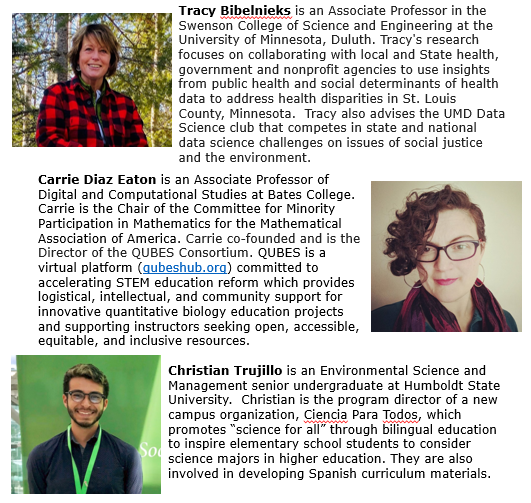January 20, 2021 Seminar in our Conversations on Data and Diversity Series
Below you find a list of our panelists and their backgrounds, a video recording of the seminar with times listed from the video when you can find individual components of the seminar and resources shared during the call.
Our panelists were:

Recording of the Workshop
Timing of Seminar Activities in the Video
- 0:00 Introduction and Announcements, Jody Peters (University of Notre Dame)
- 6:02 Overview of the Ecological Forecasting Initiative (EFI), Jason McLachlan (University of Notre Dame)
- 11:36 Overview of the EFI Diversity, Equity, and Inclusion (DEI) Working Group & Introduction of Panelists, Diana Dalbotten (University of Minnesota)
- 13:59 Panelist: Tracy Bibelnieks (University of Minnesota, Duluth)
- 22:29 Panelist: Carrie Diaz Eaton (Bates College)
- 39:59 Panelist: Christian Trujillo (Humboldt State University)
- 48:58 Q&A Session Moderated by Alyssa Willson (University of Notre Dame) followed by open casual discussions for those who could continue to stay for the meeting
Data Science Resources Shared By Workshop Participants and Panelists
Tools for teaching or learning data science listed by the workshop participants
R, Stack Exchange, Swirl tutorial for R, R/RMarkdown for developing content
Resources Shared by the Panelists
- Weapons of Math Destruction
- 97 Things About Ethics Everyone in Data Science Should Know
- Fairness and Abstraction in Sociotechnical Systems – the 5 “traps” of AI. https://dl.acm.org/doi/pdf/10.1145/3287560.3287598
- Algorithms of Oppression: How Search Engines Reinforce Racism
- Race After Technology
- Calling Bullshit: The Art of Skepticism in a Data-Driven World
- Joy Buolamwini – Poet of Code (https://www.poetofcode.com/)
- Ciencia Para Todos (Follow on Instagram: cienciaparatodos_hsu or email questions to hsu.cienciapt@gmail.com)
- Link to Twitter thread Carrie mentioned from a science historian about the history of the phrase 2+2=4
